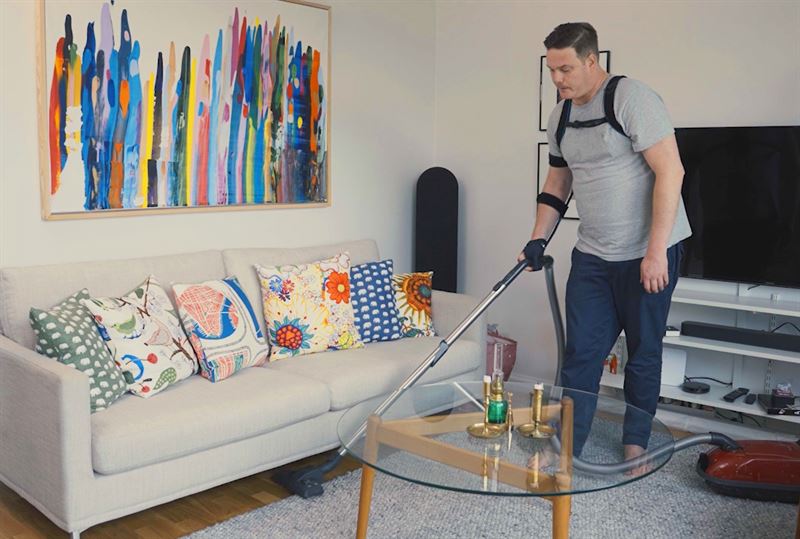Carbonhand® has a proven therapeutic effect on grip strength, hand function, and quality of life

In the recently completed iHand study, a therapeutic, i.e. lasting, effect regarding grip strength and hand function was demonstrated after six weeks of using Carbonhand. The final results presented today show that the people who participated and used the Carbonhand grip-strengthening glove during activities in daily life improved their grip strength by an average of 24%.

Today, the final results from the iHand study*, which was carried out in collaboration with the research institute RRD in the Netherlands, are presented. The result of using Carbonhand for six weeks gives an improvement in hand strength by 24% (+1.9 kg), with a residual effect of 22% (+1.6 kg) 4 weeks after the end of the intervention period.
People with reduced grip strength and/or reduced hand function have been included in the study regardless of underlying illness or injury. They have only been checked to have a stable phase in their disease state, so that spontaneous change does not occur during the course of the study. They have then used the Carbonhand at home for 6 weeks during activities of daily living. After this intervention period, the subjects were carried out follow-up measurements 4 weeks after the end of using Carbonhand.
The final results are presented simultaneously at two international congresses, the World Congress of Neurorehabilitation (WCNR) in Vienna and the Congress of Hand Surgery (SFRM-GEMMSOR) in Paris, organized by the French Society of Hand Surgery.
Analyzes of the results on grip strength have also been carried out on different subgroups. Those who have had the greatest therapeutic effect of Carbonhand are people with peripheral orthopedic injuries, such as fractures in the hand, nerve damage after surgery, or brachial plexus injury. Other patient groups that have greatly improved grip strength are those with damage to the central nervous system such as stroke, MS, or spinal cord injury. A strong improvement in grip strength is also seen in people with rheumatic diseases or osteoarthritis.
In addition to the primary outcome measure grip strength, secondary outcome measures have also been used in the study, including the Action Research Arm Test (ARAT) which measures hand function, the Numerical Pain Rating Scale (NPRS) for pain assessment and questionnaires such as the Michigan Hand Outcomes Questionnaire (MHQ) which examines how people estimate their ability to perform activities of daily living as well as the quality of life form. Data such as time spent has also been collected using Carbonhand, in order to investigate the dose-response relationship between using Carbonhand with different assessment instruments. Results based on these performance measures will be presented as the analyzes are completed and verified.
A significant improvement in hand function has already been indicated based on the Interim result of the Jebsen-Taylor Hand Function Test (JTHFT) assessment instrument. The analysis of the results from 49 of the study participants shows significant improvement in hand function from the baseline measurement to the measurement after the intervention period, as well as therapeutic effect, from the end of the intervention to 4 weeks after the end of the intervention. The JTHFT consists of seven activities that the participants in the study perform in time. A significant improvement in time was shown in six out of seven activities in the test.
When analyzing the data from all 63 participants, a significant improvement in quality of life has also been demonstrated with the assessment instrument EQ-5D-5L, an assessment form with five response levels in five different areas: mobility, activities, hygiene, pain/discomfort and anxiety/depression, and consists of a visual analog scale (EQ VAS) for self-rated health between 0–100. The assessment instrument is the international golden standard and is used as a basis in health economic analyses, which aim to assess costs and health effects in connection with resource use in healthcare.
"Being able to demonstrate the clinical benefit of using Carbonhand is crucial for Bioservo, which now has the opportunity to enter the rehab market with new conditions. The result of the iHand study will be the starting point for a health economic analysis, which is often used as an important decision-making basis for procurement in Sweden and internationally, both within compensation systems and by insurance companies." says Petter Bäckgren, CEO at Bioservo and continues "My assessment is that when we can now offer relevant decision support for healthcare, more patients will have the opportunity to be offered Carbonhand".
For more information, please contact
Petter Bäckgren, VD, Bioservo Technologies AB
Phone: +468 21 17 10
[email protected]
Mikael Wester, Marketing Director, Bioservo Technologies AB
Phone: +468 21 17 10
[email protected]
About Bioservo Technologies
Bioservo Technologies AB (publ) is a world leading company in wearable muscle strengthening systems for people in need of extra strength and endurance. All our innovative products and systems are designed to keep people strong, healthy, and efficient. The company has a unique global position within soft exoskeleton technology for the hand, both for industrial applications to improve the health for workers and to improve quality of life for people with reduced muscle strength. Bioservo Technologies was founded in 2006 in collaboration between researchers at the Royal Institute of Technology and a doctor at Karolinska University Hospital. Bioservo Technologies is a Swedish public limited company with headquarters in Stockholm.
FNCA Sweden AB is the company’s Certified Adviser on Nasdaq First North
For more information, please visit www.bioservo.com
* Kottink AIR, Nikamp CDM, Buurke JH, Bos F, van der Sluis CK, van den Broek M, Onneweer B, Stolwijk-Swüste JM, Brink SM, Rietman JS, Prange-Lasonder GB. Six weeks use of a wearable soft-robotic glove during ADL: preliminary results of ongoing clinical study. 5th International Conference on Neurorehabilitation (ICNR), Oct 13-16 2020. The clinical trial has been carried out within the framework of the iHand project. The project has received funding from the European Union's research and innovation program Horizon 2020 under grant agreement no. 801945.

